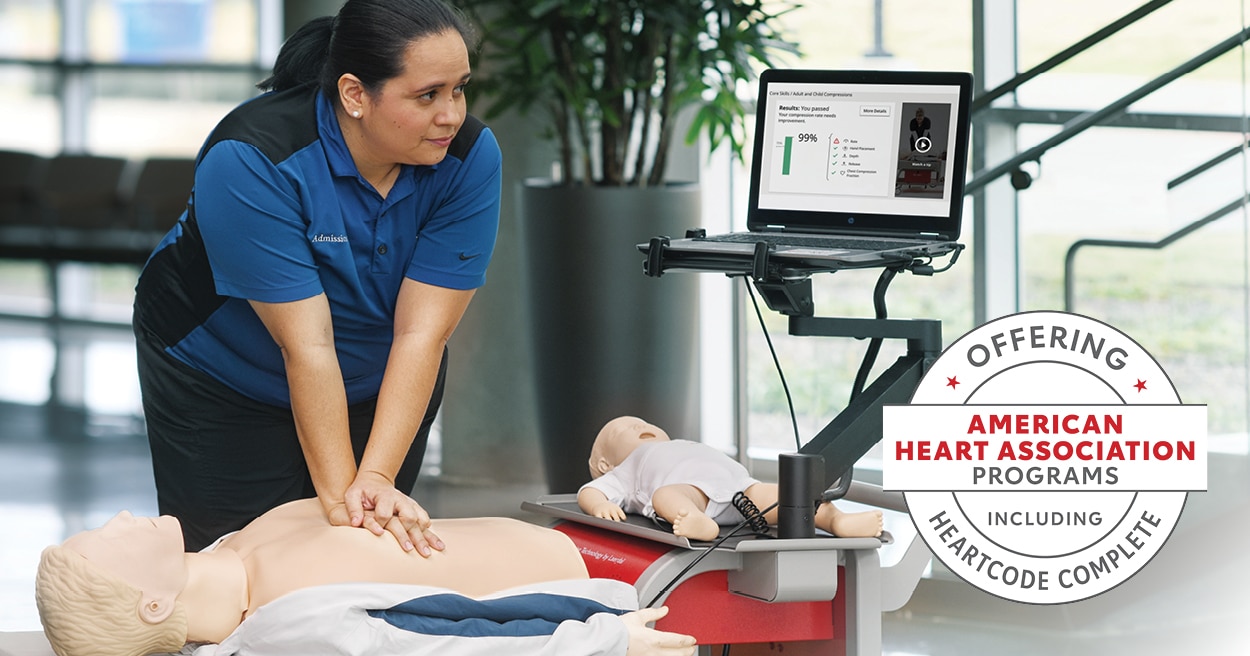American Heart Association© BLS CPR Certification Classes in Oakland

American Heart Association© BLS
Course Name: BLS CPR Provider Heartcode (Initial or Renewal)
Online Course Length: 1-2 hours (At your home.)
Skills Testing: 40-60 minutes (At one of our over 55 CPR testing sites.)
Description: CPR (adult, children, & infant), 2 person CPR, AED, bag valve mask
Price: $120 (This includes the online BLS course, skills testing, and card.)
Certification: American Heart Association© BLS certification card.
When: BLS classes are offered Monday – Sunday from 7 am to 6 pm
Card Issuance: You will receive the card on day of class.
Add ons available: ACLS, PALS, First-aid, Opioid, or Bloodborne Pathogens
Low Price Guarantee: Lowest prices in Northern CA. Price matching policy.
View BLS Courses in Oakland & Other Cities Near You
The Importance of American Heart Association BLS CPR Classes in Oakland
In moments of crisis, every second counts. This reality is particularly evident when facing cardiac emergencies. In Oakland, California, the American Heart Association (AHA) offers Basic Life Support (BLS) CPR classes, providing individuals with the knowledge and skills necessary to respond effectively to life-threatening situations. This article delves into the importance of BLS CPR training, the offerings of the American Heart Association in Oakland, and the impact these classes have on the community’s safety.
Understanding the Importance of BLS CPR Training
Cardiac arrest strikes suddenly and often without warning. According to the American Heart Association, approximately 350,000 cardiac arrests occur outside of hospitals each year in the United States. In these critical moments, the actions of bystanders can mean the difference between life and death. BLS CPR training equips individuals with the ability to recognize cardiac emergencies, initiate CPR, and utilize automated external defibrillators (AEDs) effectively.
BLS CPR training goes beyond the basic techniques taught in standard CPR classes. It focuses on high-quality CPR, emphasizing the importance of chest compressions and proper ventilation to maintain blood flow and oxygenation to vital organs. Additionally, participants learn to work as a team, coordinate efforts with emergency medical services, and manage cardiac arrest scenarios in various environments.
The American Heart Association’s Commitment to Community Safety
The American Heart Association is a globally recognized leader in cardiovascular research, education, and advocacy. Committed to reducing the impact of heart disease and stroke, the AHA offers a range of educational programs, including BLS CPR classes, designed to empower individuals to respond effectively to cardiac emergencies.
In Oakland, the AHA collaborates with local healthcare providers, community organizations, and educational institutions to make BLS CPR training accessible to residents. These classes are facilitated by certified instructors who bring expertise and real-world experience to the training environment. Through hands-on practice and interactive simulations, participants gain confidence in their ability to perform life-saving interventions when faced with cardiac emergencies.
The Comprehensive Offerings of BLS CPR Classes in Oakland
The BLS CPR classes offered by the American Heart Association in Oakland cater to a diverse range of participants, including healthcare professionals, first responders, educators, childcare providers, and members of the general public. These classes are tailored to meet the specific needs and skill levels of each group, ensuring that participants receive relevant and practical instruction.
The curriculum covers essential topics such as adult, child, and infant CPR techniques, use of AEDs, relief of choking, and recognition of cardiac arrest rhythms. Participants also learn how to respond to special situations, including opioid overdoses and advanced airway management. Moreover, the AHA emphasizes the importance of continuous learning and skill retention, offering refresher courses and online resources to reinforce knowledge and competence.
Beyond imparting life-saving skills, BLS CPR classes foster a culture of preparedness and community resilience. Participants not only gain the ability to respond effectively to emergencies but also become advocates for cardiovascular health and safety in their homes, workplaces, and communities. By investing in BLS CPR training, individuals contribute to a safer and more compassionate society.
The Impact on Community Safety and Well-Being
The impact of BLS CPR training extends far beyond the classroom. Each participant who completes a BLS CPR class in Oakland becomes a potential life-saver, capable of intervening decisively in cardiac emergencies. These skills can make a profound difference in the outcome of a cardiac arrest, increasing the likelihood of survival and reducing the risk of long-term disability.
Furthermore, BLS CPR training promotes a culture of civic responsibility and mutual aid. As more individuals in Oakland become trained in CPR, the community’s overall resilience to cardiac emergencies improves. This network of trained responders forms a vital link in the chain of survival, complementing the efforts of emergency medical services and improving outcomes for cardiac arrest victims.
Conclusion
In Oakland, California, BLS CPR classes offered by the American Heart Association play a crucial role in empowering individuals to respond effectively to cardiac emergencies. By equipping participants with the knowledge and skills necessary to perform high-quality CPR, these classes contribute to community safety and well-being. Through collaboration, education, and advocacy, the AHA and its partners in Oakland strive to create a more prepared and resilient society, where every individual has the potential to be a life-saving hero.
FAQs
Who should attend BLS CPR classes in Oakland?
BLS CPR classes are suitable for a wide range of individuals, including healthcare professionals, educators, childcare providers, and members of the general public who want to be prepared to respond to cardiac emergencies.
How long does it take to complete a BLS CPR class?
The duration of BLS CPR classes in Oakland typically ranges from four to six hours, depending on the specific course provider and format. Some providers may offer accelerated options for individuals with prior CPR training.
Is BLS CPR certification valid nationwide?
Yes, BLS CPR obtained in Oakland is valid nationwide. The certification is issued by the American Heart Association and is recognized by healthcare organizations, employers, and regulatory bodies across the United States.

